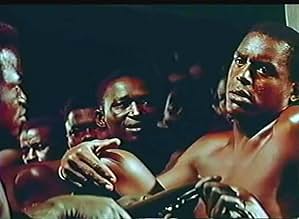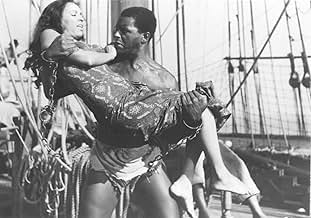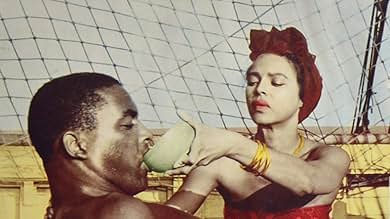Tamango
- 1958
- Tous publics
- 1h 44min
NOTE IMDb
6,5/10
469
MA NOTE
Ajouter une intrigue dans votre langueA Dutch slave captain, on a voyage to Cuba, faces a revolt fomented by a newly captured African slave, Tamango. The slaves capture the captain's mistress, forcing a showdown.A Dutch slave captain, on a voyage to Cuba, faces a revolt fomented by a newly captured African slave, Tamango. The slaves capture the captain's mistress, forcing a showdown.A Dutch slave captain, on a voyage to Cuba, faces a revolt fomented by a newly captured African slave, Tamango. The slaves capture the captain's mistress, forcing a showdown.
- Réalisation
- Scénario
- Casting principal
Avis à la une
Arguably more interesting as a social document and a step forward in mainstreams films dealing with race, than as a drama.
On a slave ship carrying Africans from their homeland to slavery in the American south, a charismatic young warrior attempts to organize a revolt. Meanwhile, Dorothy Dandridge plays captain Curt Jurgens' mistress, featuring interracial kissing and sexuality at a time very few American films would go near the subject. Add in the complexity that Dandridge's subjugated Lucy is a far more empathetic figure than any white character, and that Tamango and his fellow captives are show to be in every way – morally, strategically as well as physically better than their white captors, and you have a film that was way ahead of it's time.
That said there is odd flat quality in the drama and less than thrilling acting and film-making that keep the actual story from living up to it's potential. But it's still pretty involving, and worth seeing at least as a part of films' maturing around racial issues.
Interestingly, blacklisted director John Berry, went on to direct another racially 'ahead of it's time' film; 1974's "Claudine", one of the first mainstream American films to try and intelligently deal with the struggles of poor urban African Americans without falling into exploitation, violence or cliché.
On a slave ship carrying Africans from their homeland to slavery in the American south, a charismatic young warrior attempts to organize a revolt. Meanwhile, Dorothy Dandridge plays captain Curt Jurgens' mistress, featuring interracial kissing and sexuality at a time very few American films would go near the subject. Add in the complexity that Dandridge's subjugated Lucy is a far more empathetic figure than any white character, and that Tamango and his fellow captives are show to be in every way – morally, strategically as well as physically better than their white captors, and you have a film that was way ahead of it's time.
That said there is odd flat quality in the drama and less than thrilling acting and film-making that keep the actual story from living up to it's potential. But it's still pretty involving, and worth seeing at least as a part of films' maturing around racial issues.
Interestingly, blacklisted director John Berry, went on to direct another racially 'ahead of it's time' film; 1974's "Claudine", one of the first mainstream American films to try and intelligently deal with the struggles of poor urban African Americans without falling into exploitation, violence or cliché.
Captain Reiker (Curd Jürgens) loads a new shipment of slaves destine for Cuba. Tamango (Alex Cressan), the lion hunter, tries to lead a revolt but most slaves are only farmers. Aiché (Dorothy Dandridge) is a slave owned by the Captain. Doctor Corot (Jean Servais) is a Frenchman conflicted about slavery.
It's a black empowerment movie. There is a fascinating scene with Reiker haggling with the chief over his payment. The actors are all terrific. I do question about escaping into the cargo hold. If there are fewer escaped slaves, then a quick retreat may make more sense. While the final ending makes poetic sense, it's not the most action-filled possible. Aiché is still great and her decision is extremely powerful. The most impressive part may be when this movie was released. It's in the era of Sydney Poitier, the heroic but non-threatening black. This is different and that's great.
It's a black empowerment movie. There is a fascinating scene with Reiker haggling with the chief over his payment. The actors are all terrific. I do question about escaping into the cargo hold. If there are fewer escaped slaves, then a quick retreat may make more sense. While the final ending makes poetic sense, it's not the most action-filled possible. Aiché is still great and her decision is extremely powerful. The most impressive part may be when this movie was released. It's in the era of Sydney Poitier, the heroic but non-threatening black. This is different and that's great.
The precedent user is right:it's based on a famous short story from Prosper Mérimée.It's strange that the writer's name does not appear in the credits on the IMDb page.Dorothy Dandrige had already been in "Carmen Jones " ,a Bizet opera based on another famous short story by...Prosper Mérimée.
"Tamango" was a failure when it was released and during the sixties,John Berry ,who had made a film noir chef d'oeuvre in the fifties ,"He ran all the way" was relegated to direct French pop star Johnny Hallyday in a forgotten turkey "A Tout Casser" .
"Tamango" is a well-made movie but it is icily impersonal.Aisha's character's evolution is predictable.On the other hand ,there's a good use of the wide screen (cinemascope ) particularly effective when it comes to depict the hold where the slaves cram.The documentary side is the most successful,and "Tamango" can be looked upon as the granddaddy of the "Roots " series in the seventies.Tamango himself is close to Kunta in that 1977 Marvin Chomsky's work.
"Tamango" was a failure when it was released and during the sixties,John Berry ,who had made a film noir chef d'oeuvre in the fifties ,"He ran all the way" was relegated to direct French pop star Johnny Hallyday in a forgotten turkey "A Tout Casser" .
"Tamango" is a well-made movie but it is icily impersonal.Aisha's character's evolution is predictable.On the other hand ,there's a good use of the wide screen (cinemascope ) particularly effective when it comes to depict the hold where the slaves cram.The documentary side is the most successful,and "Tamango" can be looked upon as the granddaddy of the "Roots " series in the seventies.Tamango himself is close to Kunta in that 1977 Marvin Chomsky's work.
"Tamango" is a rousing and intelligent tale of a slave ship revolt in the 18th century. It strives to avoid transparent moralizing and overt stereotypes, particularly by placing the gorgeous Dorothy Dandridge in the pivotal role of the Captain's mistress. She must decide whether to send him to his certain demise among her fellow Africans (as Leonard Maltin avers, it's way ahead of its time). Perhaps this even-handedness is not all that surprising given the fact that it was directed by the blacklisted John Berry, who found refuge in France after helming several sensitive films noirs about the urban American underclass.
Most references give the film's literary source as a novella by French author Prosper Merimée. However, I recently stumbled upon an article in the "New York Times" (August 24, 2005) concerning a South African archaeologist who is combing a beach off Cape Horn for the wreck of a Dutch slave ship named the Meermin. The history given of this particular ship is pretty much a blow-by-blow description of this film (apart from the miscegenation), even down to the very details of how the slaves were given their chance, and how the surviving crew foiled them at one point. I can't remember if the film acknowledges any true-to-life origins, but this shivery narrative certainly lends the movie even more credence.
Most references give the film's literary source as a novella by French author Prosper Merimée. However, I recently stumbled upon an article in the "New York Times" (August 24, 2005) concerning a South African archaeologist who is combing a beach off Cape Horn for the wreck of a Dutch slave ship named the Meermin. The history given of this particular ship is pretty much a blow-by-blow description of this film (apart from the miscegenation), even down to the very details of how the slaves were given their chance, and how the surviving crew foiled them at one point. I can't remember if the film acknowledges any true-to-life origins, but this shivery narrative certainly lends the movie even more credence.
It's ironic to me that in the late 50s when the civil rights movement was getting
into high gear it was a French film that talked about slavery. Very few films
were made about the slave trade in studio era Hollywood. Offhand I can think of only two, Paramount's Souls At Sea and MGM's Stand Up And Fight.
Tamango was a French film and the title role is played by one Alex Cressan who made this and no other film. He is captured and sold to Dutch slavers and bound for Havana with others in a ship captained by Curt Jurgens.
Jurgens who does a lot of his thinking from south of the border has a bit of comfort in the bewitching Dorothy Dandridge. She's resigned herself to her life as a concubine, but has some concerns for her fellow Africans.
Herein is the problem with Tamango, A really good film about the brutality of the slave trade is spoiled by a personal story that seems almost soap operish. The cargo also carries woman slaves as well and no doubt the crew took and the captain could have availed himself there and I'm sure many did. It was the same criticism I made about All The Brothers Were Valiant where Robert Taylor has Ann Blyth aboard. You just didn't bring women on board back in those days. Too many problems with the crew's morale.
In any event the revolt of the cargo of slaves was well done and truly inspirational. Could be compared with Amistead which was about a true incident of a slave revolt.
A good film that falls just short of greatness is Tamango.
Tamango was a French film and the title role is played by one Alex Cressan who made this and no other film. He is captured and sold to Dutch slavers and bound for Havana with others in a ship captained by Curt Jurgens.
Jurgens who does a lot of his thinking from south of the border has a bit of comfort in the bewitching Dorothy Dandridge. She's resigned herself to her life as a concubine, but has some concerns for her fellow Africans.
Herein is the problem with Tamango, A really good film about the brutality of the slave trade is spoiled by a personal story that seems almost soap operish. The cargo also carries woman slaves as well and no doubt the crew took and the captain could have availed himself there and I'm sure many did. It was the same criticism I made about All The Brothers Were Valiant where Robert Taylor has Ann Blyth aboard. You just didn't bring women on board back in those days. Too many problems with the crew's morale.
In any event the revolt of the cargo of slaves was well done and truly inspirational. Could be compared with Amistead which was about a true incident of a slave revolt.
A good film that falls just short of greatness is Tamango.
Le saviez-vous
- AnecdotesAt initial release, depiction of interracial romance caused the film to be banned in the United States and in the French colonies.
- ConnexionsFeatured in Biography: Dorothy Dandridge: Little Girl Lost (1999)
Meilleurs choix
Connectez-vous pour évaluer et suivre la liste de favoris afin de recevoir des recommandations personnalisées
- How long is Tamango?Alimenté par Alexa
Détails
- Date de sortie
- Pays d’origine
- Langue
- Aussi connu sous le nom de
- Die schwarze Sklavin
- Lieux de tournage
- Sociétés de production
- Voir plus de crédits d'entreprise sur IMDbPro
- Durée
- 1h 44min(104 min)
- Rapport de forme
- 2.35 : 1
Contribuer à cette page
Suggérer une modification ou ajouter du contenu manquant




























